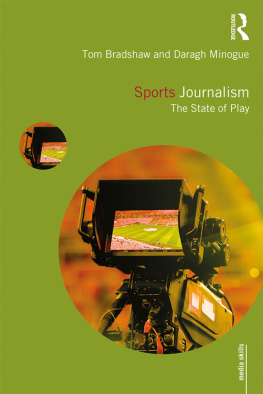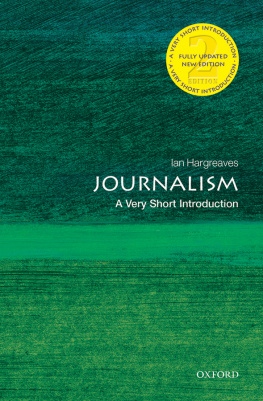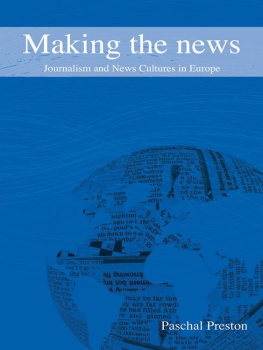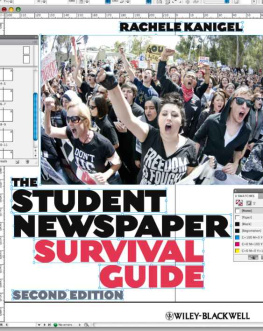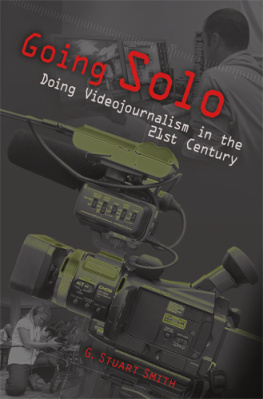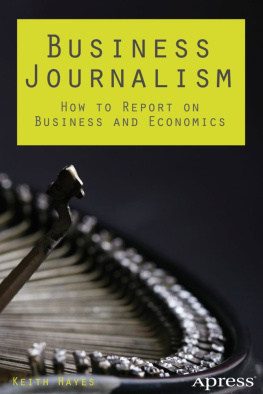Page List
STUDENT JOURNALISM & MEDIA LITERACY

Published in 2015 by The Rosen Publishing Group, Inc.
29 East 21st Street, New York, NY 10010
Copyright 2015 by Megan Fromm, Homer L. Hall, and Aaron Manfull
First Edition
All rights reserved. No part of this book may be reproduced in any form without permission in writing from the publisher, except by a reviewer.
Library of Congress Cataloging-in-Publication Data
Hall, Homer L.
Student journalism and media literacy/Homer L. Hall, Aaron Manfull and Megan Fromm.First edition.
pages cm
Includes bibliographical references and index.
ISBN 978-1-4777-8132-6 (library bound)
1. Journalism, High school. 2. Media literacy. I. Manfull, Aaron. II. Fromm, Megan. III. Title.
LB3621.5.H36 2015
070.40712dc23
2014023227
Manufactured in the United States of America
CONTENTS
Were so glad you are learning more about the exciting world of journalism. As young adults who engage with media production, both now as students and later as adults, you will have a chance to shape our world in exciting ways. Just think about it: You could be responsible for creating the content that others read, watch, and listen to in the future.
However, we know that many of you might choose professions other than journalism. Theres a wide array of opportunities at your feet, and perhaps youll want to follow a different path. You may not be a journalist in the future, but you will live in a world that is saturated with media content.
In addition to learning about how journalism works and how a news story is put together, you will also read about how the media interacts with other issues in our society, both for journalists themselves and for everyday citizens. Youll explore more about why journalism works in certain ways, how it has changed over the years, and how technology is driving adaptation. Youll also read more about how citizens can play a role in the media of the future and the challenges todays journalists face. Most important, youll hear from professionals working in the field across all types of mediaas a website producer, a data and nonprofit journalist, and even a cybersecurity expert.
By taking the time to learn more about journalism and media literacy, youll be better prepared to handle all the mediathe good, bad, true, and falsethat is sure to play a significant role in your future.

Journalism can never be silent: That is its greatest virtue and its greatest fault. It must speak, and speak immediately, while the echoes of wonder, the claims of triumph and the signs of horror are still in the air.
Henry Anatole Grunwald, former TIME Editor-in-Chief
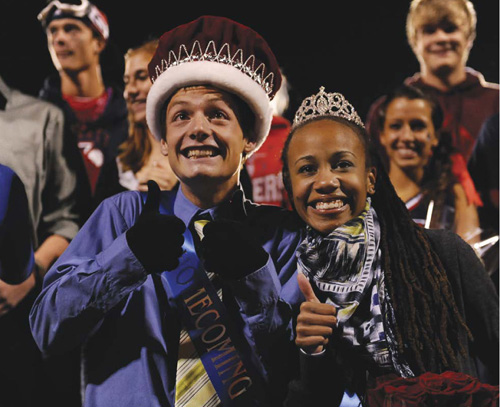
WHAT IS NEWS?
INFO YOU CAN USE
DEFINE NEWS
For high school print newspapers, the word recent sometimes causes problems that it does not cause for the professional media. Because many high school papers publish only once a week or even once a month, it is difficult for them to publish recent news if recent means something that has occurred within the last 24 hours.
Therefore, high school print papers should strive to provide new information. Generally, future events are more important than past events for high school papers. Old news tends to be stale.
While most high school print newspapers should focus on stories with new information, previews, and features, high school online news outlets should focus on what they are able to do best, which is get recent news out quickly and accurately, previewing things that will happen, and talking about things that just happened or that are in the middle of happening.
ELEMENTS THAT MAKE NEWS INTERESTING
There are a number of factors that make facts become interesting to people so they can become news. Here are eight elements that can make the facts in news interesting to readers.
TIMELINESS Writers should work to make stories about topics relevant now. Stories are much more interesting to people if they are about something that has recently happened or something that is going to happen. This could be a preview of an event or a recap of information that was disseminated for the first time. Events from the past can even become news if there is something new that is learned about the event.
PROXIMITY Write on topics dealing with your high schools community or at least on topics of concern to teenage readers. A national topic such as a proposal to increase the minimum wage for teenagers would be of vital interest to readers at any school. However, be sure to localize the topic by quoting readers or local community business owners and show how this new law would impact people in your community. Work to avoid rehashing information state and national media are reporting and make the story your own.
CONSEQUENCE Always be aware of any effect the story will have on the readers. A story dealing with increased graduation requirements will affect more readers than one naming new members of the National Honor Society, for example.
PROMINENCE Names make news, and the names of well-known persons involved in an event are more newsworthy than those of unknowns. For example, a story on the principal of your school involved in a lawsuit would be more newsworthy than a story on an unknown freshman similarly involved. Think about this in the national media. While celebrity weddings and divorces are often splashed across the front pages of magazines and newspapers throughout the world, weddings and divorces of normal people in your community will not get the same coverage.

FOUNDATION OF JOURNALISTIC WRITING
THE FIVE Ws OF JOURNALISM FROM A DIVERSE PERSPECTIVE
Who: Whos missing from the story?
What: Whats the context for the story?
Where: Where can we go for more information?
When: When do we use racial or ethnic identification?
Why: Why are we including or excluding certain information?
Compiled by Aly Coln, Ethics & Diversity Faculty, Poynter Institute
CONFLICT Readers like stories about controversial events. A conflict between groups about the number of religious songs to sing at a choral concert would be more newsworthy than the naming of the new cheerleaders, unless there was a controversy about the method of cheerleader selection.
EMOTIONS Stories that play on the emotionsthat make the reader laugh, cry, or become upsetare more newsworthy than ones that evoke no reaction. For example, a story on a study reporting that girls are smarter than boys might impel boys to write letters to the editor. A topic such as differences in abilities between sexes often touches readers emotions. Possible stories might be a comparison of how many girls and how many boys have been named National Merit Finalists in the past 10 years, how many of each sex have been selected to the National Honor Society, how many of each sex have received athletic scholarships, or how many of each sex have won special honors of any kind.




